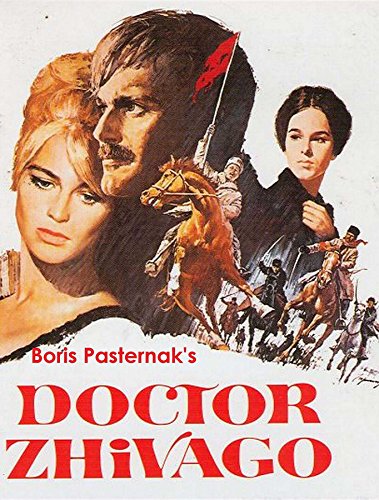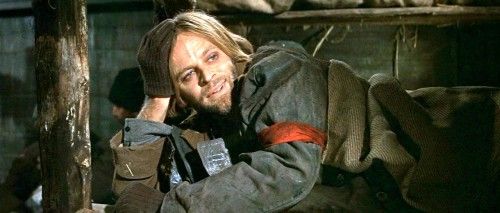Klaus Kinski is the main reason to watch the 1965 film, Doctor Zhivago.
The legendarily difficult and erratic Mr. Kinski shows up about halfway through this 3-and-a-half hour film. He plays a cynical and unstable prisoner on a train. The train is full of passengers who are escaping from Moscow and heading for what they hope will be a better and more stable life in the Ural Mountains. (The film takes place during the Communist revolution and the subsequent purges.) That Kinski taunts everyone on the train is not a surprise. Both Werner Herzog and David Schmoeller (who directed Kinski in Crawlspace) have made documentaries in which they both talked about how difficult it was to work with Kinski and how several film crews apparently came close to murdering Klaus Kinski several times throughout his career.
Instead, what’s surprising about Kinski’s performance is that he’s even there to begin with. Doctor Zhivago is an extremely long and extremely stately film. It’s one of those films where almost every actor gives a somewhat restrained performance. It’s a film where almost every shot is tastefully composed and where the action often slows down to a crawl so that we can better appreciate the scenery. It’s a film that stops for an intermission and which opens with a lengthy musical overture. In short, this is a film of old school craftsmanship and it’s the last place you would expect to find Klaus Kinski luring about.
When he does show up, you’re happy to see him. Even though he’s only onscreen for about five minute, Kinski gives the film a jolt of much-needed energy. After hours of watching indecisive characters talk and talk and talk, Kinski pops up and basically, “Screw this, I hate everything.” And it’s exciting because it’s one of the few time that Doctor Zhivago feels unpredictable. It’s one of the few times that it feels like a living work of art instead of just a very pretty but slightly stuffy composition.
Just from reading all that, you may think that I don’t like Doctor Zhivago but that’s actually not the case. It’s a heavily flawed film and you have to be willing to make a joke or two if you’re going to try to watch the whole thing in just one sitting but it’s still an interesting throwback to a very specific time in film history. Doctor Zhivago was designed to not only be a spectacle but to also convince audiences that 1) TV was worthless and that 2) Hollywood craftsmanship was still preferable to the art films that were coming out of Europe. At a time when television and independent European cinema was viewed as being a real threat to the future of the film industry, Doctor Zhivago was a film that was meant to say, “You can’t get this on your black-and-white TV! You can only get this from Hollywood where, dammit, people still appreciate a good establishing shot and treat the production code with respect!” Even today, some of the spectacle is still impressive. The beautiful shots of the countryside are still often breath-taking. The scenes of two lovers living in an ice filled house are still incredibly lovely to look at. The musical score is still sweepingly romantic and impressive.
It’s the story where the film gets in trouble. Omar Sharif plays Yuri Zhivago, a doctor and a poet who falls in love with Lara (Julie Christie) while Russia descends into chaos. The Czar is overthown. The communists come to power and prove themselves to be just as hypocritical as the Romanovs. The revolutionary Pasha (Tom Courtenay, bearing a distracting resemblance to Roddy McDowall) is in love with Lara and helps to bring about the revolution but is then declared an enemy of the people during the subsequent purges. The craven Komarovsky (Rod Steiger) also wants to possess Lara and he’s so corrupt that he manages to thrive under both the Czar and the communists. Alec Guinness plays Yuri’s half-brother and is the most British Russian imaginable. Doctor Zhivago is based on a Russian novel so there’s a lot of characters running around and they’re all played by a distinguished cast of international thespians. However, none of them are as interesting as the scenery.
As for the two main actors, Omar Sharif and Julie Christie convince you that they’re in love but not much else. Sharif is never convincing as a poet and he feels miscast as a man who spends most of his time thinking. Reportedly, Lean’s first choice for the role was Peter O’Toole and it’s easy to imagine O’Toole in the part. But O’Toole had already done Lawrence of Arabia with Lean and didn’t feel like subjecting himself to another year of Lean’s notoriously prickly direction. So, the role went to O’Toole co-star, Sharif. Julie Christie turned down Thunderball to do both this film and Darling, for which she would subsequently win an Oscar.
(Speaking of the Oscars, Doctor Zhivago was nominated for Best Picture and, though it won five other Oscars, it lost the big prize to The Sound of Music, of all things. 1965 really wasn’t a great year for the Oscars. The only 1965 Best Picture nominee that still feels like it really deserved to be nominated is Darling. Of the other nominees, Ship of Fools is ponderous and A Thousand Clowns is almost unbearably annoying. And The Sound of Music …. well, I prefer the Carrie Underwood version.)
Doctor Zhivago is a big, long, epic film. It’s lovely to look at and it has a few nice scenes mixed in with a bunch of scenes that seem to go on forever. In the conflict between the state and the individual, it comes down firmly on the side of the individual and that’s a good thing. (The communist government attempts to suppress Yuri’s love poems because they celebrate the individual instead of society. And though the government might be able to destroy Yuri’s life, they can’t destroy his spirit. Again, it’s a message that would have worked better with a more thoughtful lead actor but still, it’s a good message.) It’s a flawed film but watch it for the spectacle. Watch it for Klaus Kinski.


 Old west outlaw Frank Calder (Oliver Reed) wants to learn how to read so he and his gang ride into the nearby town and kidnap Melissa Ruger (Candice Bergen). Because he saw her reading to a group of children, Calder assumed that Melissa was a school teacher. Instead, Melissa is the wife of a brutal cattle baron and hunter named Brandt Ruger (Gene Hackman). Even after Calder learns the truth about Melissa’s identity, he keeps it a secret from his gang because he knows that they would kill her and then kill him as punishment for kidnapping the wife of a man as powerful as Brandt. Stockholm Syndrome kicks in and Melissa starts to fall in love with Calder. Meanwhile, Brandt learns that his wife has been kidnapped and, with a group of equally brutal friends, he sets out to get her back. In Brandt’s opinion, Calder has stolen his personal property. Using a powerful and newly designed rifle, Brandt kills Calder’s men one-by-one until there is a final, bloody confrontation in the desert.
Old west outlaw Frank Calder (Oliver Reed) wants to learn how to read so he and his gang ride into the nearby town and kidnap Melissa Ruger (Candice Bergen). Because he saw her reading to a group of children, Calder assumed that Melissa was a school teacher. Instead, Melissa is the wife of a brutal cattle baron and hunter named Brandt Ruger (Gene Hackman). Even after Calder learns the truth about Melissa’s identity, he keeps it a secret from his gang because he knows that they would kill her and then kill him as punishment for kidnapping the wife of a man as powerful as Brandt. Stockholm Syndrome kicks in and Melissa starts to fall in love with Calder. Meanwhile, Brandt learns that his wife has been kidnapped and, with a group of equally brutal friends, he sets out to get her back. In Brandt’s opinion, Calder has stolen his personal property. Using a powerful and newly designed rifle, Brandt kills Calder’s men one-by-one until there is a final, bloody confrontation in the desert.